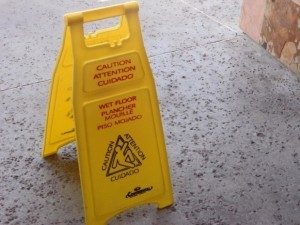 A slip-and-fall lawsuit recently ended in a $1.725 million verdict for a plaintiff in Alabama, who suffered severe and permanent injuries requiring eight surgeries, 400 doctor visits and nearly $500,000 in medical bills.
A slip-and-fall lawsuit recently ended in a $1.725 million verdict for a plaintiff in Alabama, who suffered severe and permanent injuries requiring eight surgeries, 400 doctor visits and nearly $500,000 in medical bills.
Plaintiff presented evidence to show that even though the store was open 14 hours a day, corporate policy only required employees to inspect the site for safety for a total of 10 minutes every day. These checks were “visual safety checks” that were largely informal. Workers were not required to document them. No supervisor signed off on them. There was no concrete proof they were ever even conducted. This deviated substantially from the practice of other retailers in the Mobile area, where this slip-and-fall injury occurred.
Business invitees at a retail location are owed a higher duty of care in comparison to other types of people present on a site. Texas law recognizes three categories of people on site: Invitees, licensees and trespassers. Adults trespassing are owed the least amount of care. Essentially, property owners are not allowed to cause traps that would intentionally harm them, but they don’t have to remedy or warn about any dangerous conditions. There might be exceptions for child trespassers. Licensees are those who are lawfully on site for business or social purposes. They are owed a mid-range level of care that requires a remedy of known dangers and a duty to warn of them if they are not obvious. Invitees are persons on site for the financial benefit of the property owner/ controller. For these individuals, property owners have to not only remedy dangers and warn of them, they have to inspect the site to determine whether hazards exist.
Although there is no concrete, bright-line rule for how often inspections have to be conducted, industry standards and case law determinations are often considered.
Not every slip-and-fall lawsuit will result in compensation. Plaintiffs have to prove (per the 2009 case of Fort Brown Villas II Cond. Ass’n. v. Gillenwater, that:
- Condition of property created an unreasonable risk of harm to invitee;
- Owner knew or reasonably should have known of the condition (with actual or constructive knowledge);
- Owner failed to exercise ordinary care to protect invitee from danger;
- Owner’s failure/ breach/ negligence was the proximate cause of plaintiffs’ injuries.
The rules in Alabama, where this case occurred, are similar. According to AL.com, plaintiff was a 60-year-old customer at a Dollar General store in the summer of 2012 when she slipped and fell on a clear liquid laundry detergent that had spilled onto the floor in the aisle of the store where chemicals are sold. (The fact the liquid was clear is noteworthy because had it been bright blue or some other color, defendant may have been able to argue the hazard was “open and obvious.”)
In trying to prove actual or constructive knowledge, plaintiff would need to show defendant either created the hazard, knew about it or that it existed for such a length of time that it should have been discovered. It’s not clear whether plaintiff knew when the hazard was created, but it soon became clear the store’s policy of inspecting the site for potential hazards meant it could have existed for hours before it was discovered.
Our San Antonio slip-and-fall accident lawyers know that these cases often require thorough investigation and thorough understanding of Texas premises liability law.
Contact our experienced San Antonio personal injury lawyers at (210) 308-8811.
Additional Resources:
Alabama jury returns $1.725 million verdict against Dollar General in personal injury case, Sept. 22, 2016, By Prescotte Stokes III, AL.com
More Blog Entries:
Uninsured Drivers Leave Texas Accident Victim Reeling , Sept. 20, 2016, San Antonio Slip-and-Fall Accident Lawyer Blog

Recent Comments